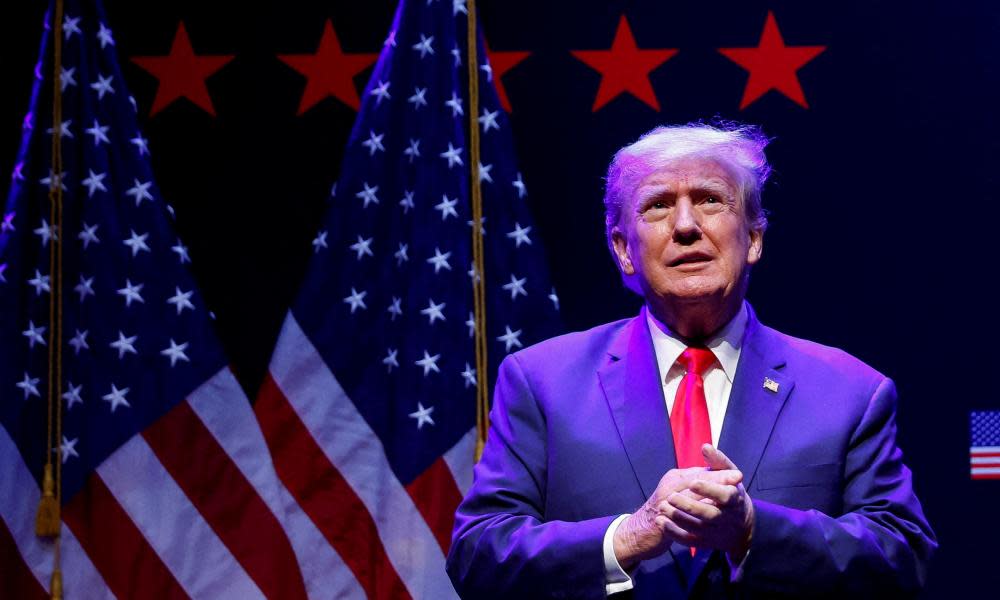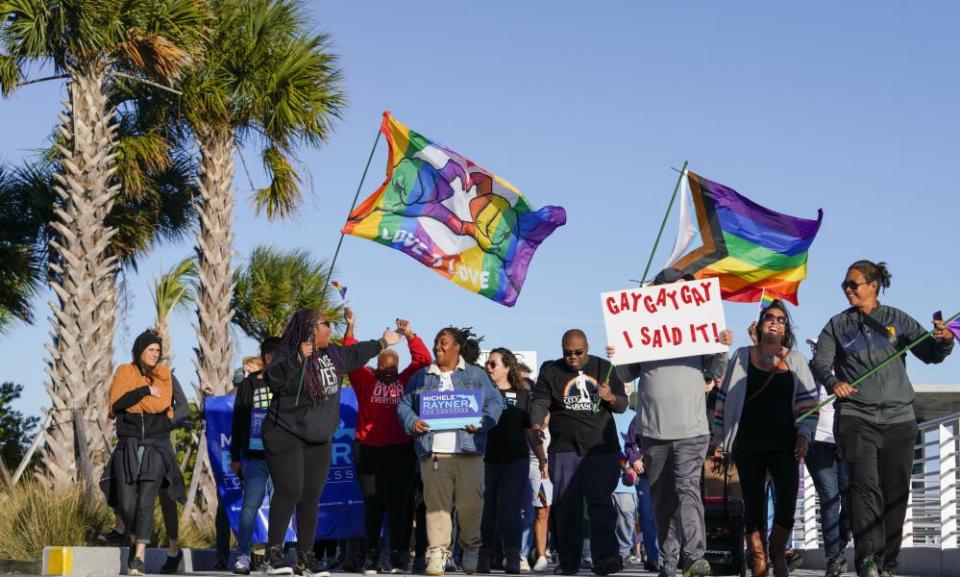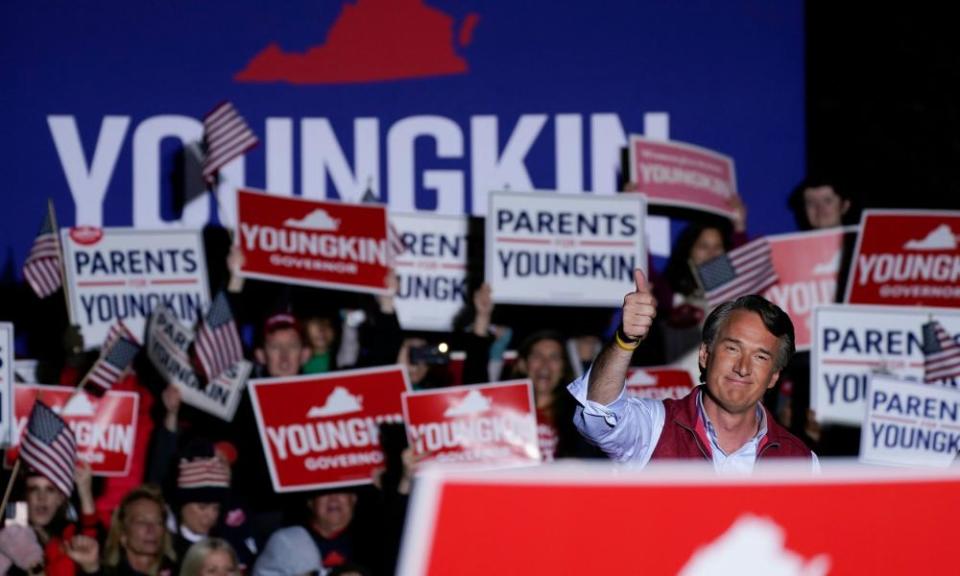‘Parents’ rights’: Republicans wage education culture war as 2024 looms

Speaking recently at a theater in Davenport, Iowa, Donald Trump marveled at the crowd’s reaction when he vowed to “bring back parental rights into our schools”. The line elicited thunderous applause – one of the loudest ovations of his nearly two-hour address.
“Can you imagine what I’m doing? I’m saying, ‘Parents, you have rights’ … and the place goes crazy,” remarked the former president, who is again seeking the Republican nomination.
With the 2024 election cycle looming, Republicans are leaning into the education culture wars, championing policies that they say will give parents more of a say in their children’s education, from the subjects they are taught to the books they read, with hopes of appealing to suburban voters who recoiled from the party during the Trump years. In their telling, Republicans are the defenders of America’s school children whose education is threatened by a leftwing ideology that promotes activism, racial history and gender fluidity over academic outcomes.
But critics and many educators say conservatives are using the term “parents’ rights” as a guise to advance a rightwing education agenda that undermines public schools, whitewashes American history and marginalizes LGBTQ+ students.
The debate took center stage in the House this week, where Republicans were poised to advance their controversial “Parents Bill of Rights”. Ahead of the vote, scheduled for Friday, Democrats and Republicans sparred bitterly over the legislation, whose sponsor argued would “bring more transparency and accountability to education” and whose opponents derisively rebranded the “politics over parents act”.
Democrats argued that the bill would only serve to embolden a far-right movement that has pushed book bans, restrictions on the instruction of American history and turned classrooms into “ground zero” for conservative culture wars.
“This legislation has nothing to do with parental involvement,” said Hakeem Jeffries, the Democratic House minority leader. “It has everything to do with jamming the extreme Maga Republican ideology down the throats of the children and the parents of the United States of America.”
Though the legislation has little chance of advancing in the Democratic-controlled Senate, it will serve as a rallying cry for Republicans on the campaign trail.
‘A line in the sand’
The origins of the “parents’ rights” movement, experts say, can be traced back to the 1925 “trial of the century” in which a Tennessee biology teacher was fined for teaching evolution in violation of state law. The term has been invoked repeatedly in the decades since, notably in clashes related to desegregation, the red scare, sex education and homeschooling.
“The idea of parents’ rights is really nothing new in American politics,” said Melissa Deckman, the CEO of the non-partisan Public Religion Research Institute who has written extensively about culture war battles in education.
The present-day movement emerged in response to the upheaval sparked by the coronavirus pandemic, when extended school lockdowns led to a burst of political activism by parents who felt overwhelmed and abandoned, and by the racial justice protests that erupted in the summer of 2020, with the murder of George Floyd. Conservative politicians were quick to seize on any backlash, channeling voter frustration into a sophisticated national campaign aimed at restricting instruction on race and gender.

As the presidential primary begins to take shape, the notional field of Republican hopefuls are using the education battles to distinguish themselves on an issue they believe has the potential to motivate their base.
By far the most aggressive education culture warrior has been Ron DeSantis, the Florida governor who is widely seen as Trump’s strongest rival for the Republican nomination, though he has not formally entered the contest.
“I think we have really done a great job of drawing a line in the sand to say the purpose of our schools is to educate kids not to indoctrinate kids,” DeSantis said at a recent event in Des Moines, Iowa.
He has pointed to his successes in Florida, where he notably signed into law the Parental Rights in Education Act, branded by critics as “don’t say gay”, which forbids the instruction of sexual orientation and gender identity in early elementary grades. He also approved the “stop woke” act that restricts conversations around race in schools, colleges and even private workplaces; banned transgender athletes from competing on women’s sports teams at public schools and colleges; and blocked high schools in the state from offering an Advanced Placement course on African American studies.
Emboldened by his re-election victory, DeSantis is now pushing a raft of education-related proposals that would go even further ahead of an anticipated White House run.

Not to be outflanked, Trump and the budding field of GOP candidates and potential contenders have also sharpened their attacks on the education system.
In Iowa this month, Trump vowed to prohibit the teaching of “critical race theory”, “transgender insanity” and “any other inappropriate racial, sexual or political content” in public classrooms while calling for universal school choice, the direct election of school principals by parents and breaking up the Department of Education.
Former vice-president Mike Pence, who built a reputation as a staunch social conservative and is weighing a run for president, has also staked out territory in the education wars, pushing what he calls a “parents’ rights” agenda. In Iowa last month, he stood with conservative parents as a federal appeals court considered a case involving a local school district’s policy to support transgender students.
Nikki Haley, Trump’s former UN secretary who is now challenging him for the nomination, has denounced critical race theory as “un-American” and blamed leftwing ideology for fueling a culture of “woke self-loathing” she has called a “virus more dangerous than any pandemic”. And in a likely preview of the education fights to come, Haley suggested Florida’s so-called “don’t say gay” law “didn’t go far enough”.
‘A front row seat’
In 2021, Virginia governor Glenn Youngkin’s victory under the banner of “Parents matter” in a state that had been steadily trending blue offered a model for Republicans candidates across the country.
“During Covid, parents for the first time weren’t just going to PTA conferences; they were literally turning their living rooms into classrooms and so they got a front row seat to curriculum, standards, grading, teaching practices,” said Kristin Davison, a top strategist for Youngkin’s gubernatorial campaign. “That awoke a number of parents across the political spectrum to demand more out of their schools.”

As governor, Youngkin issued a day one executive order prohibiting the teaching of “inherently divisive concepts, including critical race theory” from Virginia classrooms and overhauled policies related to transgender students in public schools. He also set up a tip line for parents to report teachers who raise “divisive” topics in the classroom, thought it has since been shut down.
With parents and teachers continuing to grapple with the repercussions of the pandemic on students – the learning loss and mental health challenges – Davison believes the education agenda championed by Republican politicians like Youngkin, who has also been raised as a potential presidential candidate in 2024, will only become more resonant with voters.
Since Youngkin’s election, the conservative campaign to expand parental control over public education has moved from contentious school board meetings to state capitols and now Congress. Over the last two years, Republican-controlled legislatures have enacted or are considering a dizzying array of new proposals limiting the instruction of what proponents deem “divisive concepts” in public schools.
Related: How to beat a book ban: students, parents and librarians fight back
And this week House Republicans pressed ahead with their “Parents Bill of Rights”, a centerpiece of their midterm election campaign. The measure outlines five pillars that Republicans say will guarantee a parents’ right to scrutinize library books and classroom curricula and review school budgets, among other aspects. It would also require parents’ consent before a student is allowed to change their gender designation, pronouns or name, a provision that Democrats warned would force schools to out LGBTQ+ students to their families that may not be accepting of their identity.
“Parents across this country have overwhelmingly spoken out that they have had enough,” said Republican congresswoman Julia Letlow of Louisiana, who sponsored the bill. “They want a seat at the table because at the end of the day, these are our children, not the government’s.”
‘It’s just terrible what they’re doing’
Democrats say the focus on divisive cultural issues distracts from the real challenges facing American students and public education – and suspect voters will punish Republicans for it.
They point to the midterms results and polling as evidence that voters are more concerned about school funding, teacher shortages, student mental health and campus safety than they are about the instruction of critical race theory, an academic framework for examining systemic racism in American institutions.
A pre-election memo by the Republican National Committee last year seemed to recognize that risk and last year advised candidates to center their general election pitch on “parental rights and quality education”, as opposed to cultural attacks.
And though DeSantis soared to re-election last year in Florida, several other GOP candidates for governor who pushed a socially conservative agenda lost, including in Arizona, Kansas, Michigan, Pennsylvania and Wisconsin.
“Unless we say stupid things,” Democratic pollster Celinda Lake said, a reference to the debate-stage blunder by the party’s nominee for Virginia governor that many believe contributed to Youngkin’s victory, “our proactive agenda of quality education, well-paid teachers, mental health and job skills beats their agenda of transgender, CRT every single time.”

Democrats believe they can offer a strong contrast. They are promoting an education agenda focused on boosting federal funding for public schools and raising teachers’ pay while expanding pre-K programs and increasing college affordability, plans that face strong Republican resistance.
In the president’s State of the Union address, Joe Biden, who is expected to run for re-election, proposed two years of tuition-free community college as a way to expand access to “the best career training in America.” He also used his executive authority to forgive more than $400bn in student-loan debt, an action that enraged Republicans and some Democrats and which the supreme court appears poised to invalidate.
In a recent interview, Biden criticized the flurry of legislation targeting transgender students and athletes and singled out new laws in Florida as particularly problematic.
“What’s going on in Florida is, as my mother would say, close to sinful,” he said. “It’s just terrible what they’re doing.”
‘Peddling hysteria’
For many of the teachers, parents and students caught up in the political battle of so-called parents rights, the impact has been disorienting and demoralizing.
Public school teachers, already grappling with the impacts of the pandemic on their students’ mental health and academic achievement, are now trying to navigate a thicket of new restrictions that critics say are having a chilling effect on what they can discuss in the classroom.
I don’t think it has anything to do with parental rights or education. I think it’s a fear of the future
Randi Weingarten, president of the American Federation of Teachers
Educators and librarians have come under attack, inundated with conspiracy-fueled accusations that they are “grooming” students by offering books that address LGBTQ+ issues. Some have quit or retired early, exacerbating, some say, the nation’s teacher shortage.
A survey by the Pew Research Center found that parents divided sharply along partisan lines when asked how their school-age children should be taught about gender identity, the legacy of slavery and whether they had enough influence over school curriculum. But some polls have found broader support for laws restricting certain instruction on gender and sexuality in elementary grades.
There are areas of consensus. In general, Americans strongly oppose book bans and believe students should be taught both “the good and bad” aspects of American history. And though public attitudes on transgender rights are complex and still being shaped, especially on issues involving trans youth, Americans remain widely supportive of laws that protect LGBTQ+ people from discrimination.
But as the debate over parental rights in education rages, LGBTQ+ students, and especially trans youth, say the efforts to place aggressive controls on their identities is harming their mental health, while LGBTQ+ parents in states like Florida reporting that they have considered moving away to protect their families.
“The politicians and right-wing zealots behind this anti-LGBTQ+ movement are peddling hysteria,” said Brandon Wolf of the LGBTQ+ rights group Equality Florida, adding: “While it’s a marketing ploy for those folks, it has had real impacts on people across the state.”
Randi Weingarten, president of the American Federation of Teachers, denounced Republicans’ attacks on public education as a “divisive” political strategy. While it may serve Republicans on the campaign trail, she said, it was doing a “disservice” in the classroom, where teachers must prepare students for a world that is socially, culturally and technologically different than the one into which their parents graduated.
“I don’t think it has anything to do with parental rights or education,” she said. “I think it’s a fear of the future.”

 Yahoo News
Yahoo News 
